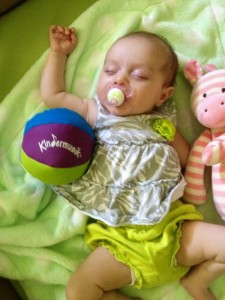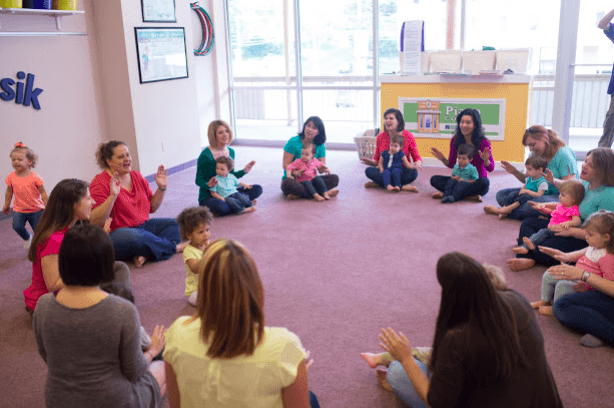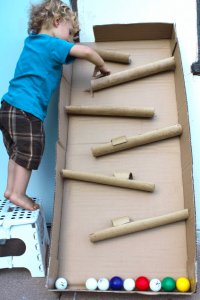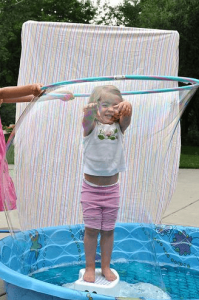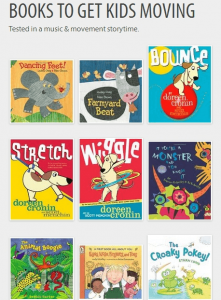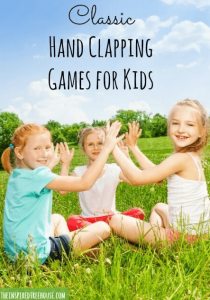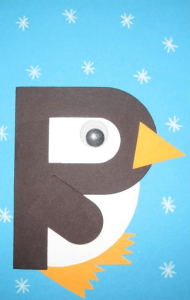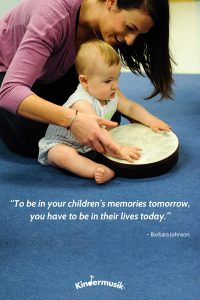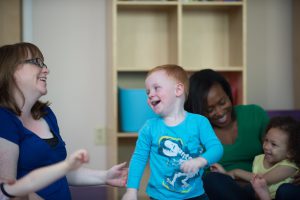Shawna Gordon
This user hasn't shared any profile information
Posts by Shawna Gordon
July Camps & Classes
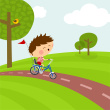
July camps and classes are set to begin the week of July 9, 2019! We have so much fun and music-making in store for all ages.
To enroll, click on the SUMMER CLASSES & CAMPS.
FREE Webinar!
November 12 ~ Free Webinar for Early Childhood Educators

Using Music to Boost Infant and Toddler Development
Kindermusik International partners with Hatch Early Learning to offer this Free Webinar, “Using Music to Boost Infant and Toddler Development.” Music is the one constant in an infant’s everyday life. All over the world, parents are bonding with their babies through musical sounds and rhythmic movement. Parents know instinctively what scientists have now proven: infants thrive on music.
Join us on November 12th as we team up with Hatch Early Learning to bring you a free webinar that will detail how and why music and movement provide the best learning vehicles for early childhood development (newborn to age 3). Kindermusik International’s Director of Professional Development, Betsy Flanagan, will lead the webinar.
- What You’ll Learn
- How immersive musical experiences create and strengthen an infant’s neural pathways
- Ways to create special bonding moments with newborn to age 3 learners
- Specific techniques that have worked in Early Head Start programs
- Active music making ideas that “light up” a baby’s entire brain
Register for this FREE Webinar on November 12 at 2pm EST.
If you’re unable to attend this webinar live, that’s no problem! Be sure to register and we will send you a link to our on-demand portal to view a recording of the live event.
Sing & Play: Contrasts in Movement and Independence in Movement
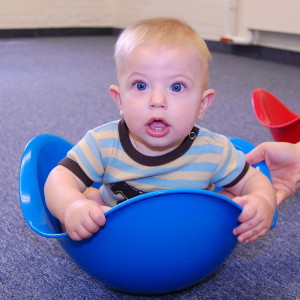 It’s a well-known fact. No matter how many parents over the years have wished for it and continue to wish for it, toddlers do not come with an on/off (or even a pause!) button. At some point around the one-year mark, a baby turns into a movement machine. Constantly on the go, crawling, standing, wobbling, walking, and, yes, eventually running and jumping everywhere and anywhere—and often away from a parent in a one-sided game of chase! All of this newfound movement is exhilarating for children and a wee bit exhausting for parents. Ah, to hit the pause button for a moment!
It’s a well-known fact. No matter how many parents over the years have wished for it and continue to wish for it, toddlers do not come with an on/off (or even a pause!) button. At some point around the one-year mark, a baby turns into a movement machine. Constantly on the go, crawling, standing, wobbling, walking, and, yes, eventually running and jumping everywhere and anywhere—and often away from a parent in a one-sided game of chase! All of this newfound movement is exhilarating for children and a wee bit exhausting for parents. Ah, to hit the pause button for a moment!
In Kindermusik class each week, we help channel all that movement energy in a way that fosters your child’s growing independence and gross-motor development, and emphasizes your unique role as your child’s first and best teacher. When we listen to “Toodala” and practice different motions around the room, dance with our scarves using contrasting movements such as high and low or up and down during “Mrs. Murphy’s Chowder,” or even when your child sits (for a moment!) on your lap to bounce to “Pancake Day, Heigh-Ho,” your little one is discovering new ways to move.
Everyday Connection: On the Go-Go Dancer. Celebrate your child’s love of being on the go with music. Put on some of your favorite songs and dance, walk, wobble, run, and jump around the house. Mix up the music to include fast and slow, loud and soft, and energetic and calm.
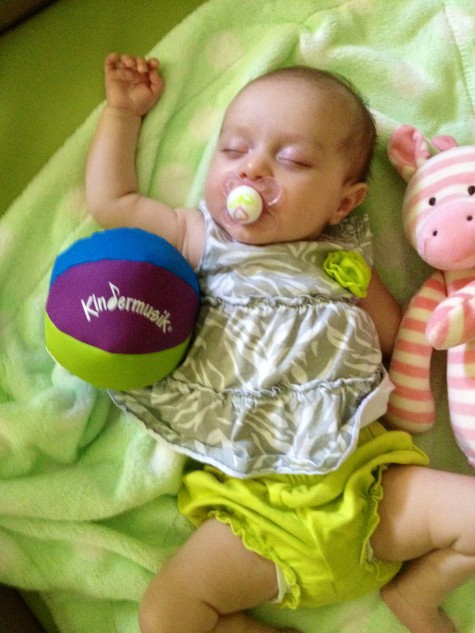
Cuddle & Bounce: Baby’s World of Patterns
During the first several months of life, babies follow a predictable pattern. Eat. Sleep. Diaper change. Eat. Sleep. Diaper change. Mathematicians call that an A-B-C pattern. Parents call it the “will-I-ever-sleep-again???” pattern. (Spoiler alert: You will…one day!) Patterns help your baby connect to and learn about the world. From recognizing the facial pattern of two eyes, a nose, and a mouth to hearing the vocal patterns of the language spoken at home to responding to the day-and-night pattern and eventually sleeping longer at night (really!).
In Kindermusik, we understand that babies and young children who learn to identify patterns strengthen their sense of safety and feel happier and more relaxed because they can better predict what happens next. Plus, a solid understanding of patterns eventually leads to success in school, especially in math, science, and reading. Each week in class, your baby experiences patterns through rhythm and meter, tempo contrasts, dances, language and vocal play, and the routine of the lesson flow. So, when your baby giggles and wiggles “going into the kitchen to take a peek” or dances with you to the changing tempos of “Peas and Carrots,” your little one gains a greater understanding of patterns—and the world.
Parenting tip: Predictable Playlists
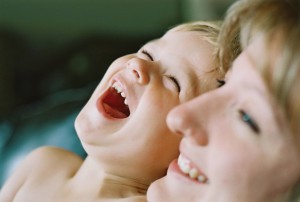 Create a special nighttime playlist filled with soothing lullabies. During your child’s last feeding or at the beginning of the nighttime routine, put on this playlist. The predictable pattern of music each night will help your child recognize the end of the day. Try these Kindermusik favorites. http://play.kindermusik.com/en/browse/style/?style_id=35&
Create a special nighttime playlist filled with soothing lullabies. During your child’s last feeding or at the beginning of the nighttime routine, put on this playlist. The predictable pattern of music each night will help your child recognize the end of the day. Try these Kindermusik favorites. http://play.kindermusik.com/en/browse/style/?style_id=35&
So you were late today? It’s OK, we are so glad you are here today!!!
To the Mom Who Showed Up Late to Music Class
I saw you today.
Yes. You!
Did you really think that you could slip in unnoticed after class already started? We had finished all the rounds of the “Hello” song and just transitioned into rhythm sticks when you and your child walked into the classroom. You held your head down trying to avoid eye contact, but your little one didn’t even think about feeling embarrassed for arriving late. Instead, she burst through the door ready to make music with her friends.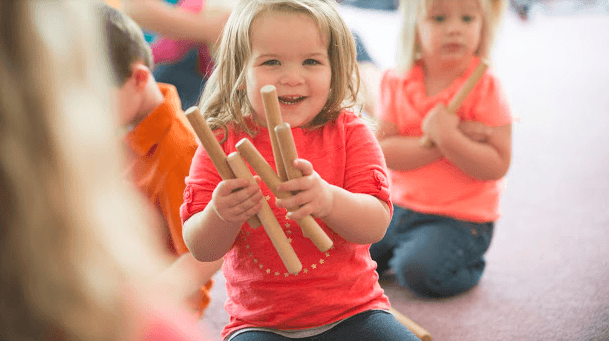
But I saw you.
Did you see me?
I smiled. Big Time. Could you guess that behind my smile I said a cheer for you: “You made it! Woo-Hoo! Good for you!”
It doesn’t matter what time the clock reads. It matters that you came. After all, time takes on a different meaning when a child enters your life. Every parent learns that lesson sooner or later. We’ve all experienced one or two (or all of these!) reasons for being late somewhere:
A Few Reasons Kids Make Us Late
- As soon as you dress your infant and strap her in the carrier she experiences her first diaper explosion—the kind your BFF warned you about—and the one you didn’t believe because she tends to exaggerate. After the shock wears off, you spend the next 30 minutes cleaning up your baby, your car, and yourself.
- Your child refuses to get dressed in anything other than his Buzz Lightyear pajamas, except said PJs are stained with who knows what and two sizes too small. After 20 minutes of intense negotiations, you arrive at a compromise of last year’s Scooby Doo Halloween costume, which is only a slightly better option.
- It takes your toddler 13 minutes to walk 10 steps to the car. She keeps stopping to investigate something spectacular—a rock, an old piece of chalk left in the rain, an ant. When you attempt to spur her on down the path, it sparks an epic meltdown on full display of the elderly couple next door. After 8 minutes, your child forgets the root of her despair and happily gets in the car.
- Ten minutes before you need to leave for class your child FINALLY decides to take a nap. You debate letting him sleep to help ward off the evening drama guaranteed to happen on “no nap” days. You opt to shorten the nap by letting him sleep 20 minutes instead of his usual 30 minutes…which means you are 10 minutes later for class. You hope a short nap is better than no nap, but only time will tell.
- YOU take a nap. Hey! Parenting is EXHAUSTING…as in “will-I-ever-sleep-again exhausting.” You needed that nap because you know you will be up three times between your child’s bedtime and 630am.
So, while your reason for arriving late may not be listed above, it’s okay. You are welcomed whether you show up early, on time, late, or not at all on some days. We understand. It’s why I wasn’t the only one who noticed you arriving late. The other parents did, too. We all widened the circle to include you. After all, we are a family and that’s what family does.
Do you want to join a community of other families who understand what it’s like to be a parent today? Find a class near you!
Contributed by Lisa Camino Rowell, a freelance writer in the Atlanta area. Through the years, she arrived late countless times to Kindermusik class (for all of the reasons listed above).
What have you done to have some fun this summer?
Popular Pinterest Pins for Summertime Fun
Looking for a few new ideas for summertime fun to add to your family’s list? Here are a few of the most popular Pinterest Pins from our Kindermusik boards.
Favorite Kindermusik Pinterest Pins for Summertime Fun
1. Create a Ball Maze. A great activity for shape identification, predictions, cause and effect, and fun!
2. Hula Hoop sized bubbles. What is this beautiful concoction? Hula Hoops AND bubbles?! Yes, please!
3. Books for young children to get them moving AND reading.
4. Five favorite Kindermusik ways to get up and move.
5. Classic Hand-Clapping Games for Kids. No worries. Adults can play, too!
6. Teach Your Child the Letter P. Turn down the summer heat and learn about penguins and the letter P.
No matter how your family chooses to celebrate summer, fall, winter, or spring, we know that you will be creating memories together!
Looking for more ideas for your family’s summer (or winter, fall, and spring) list? Join us for classes at Kindermusik of Lincoln!
Contributed by Lisa Camino Rowell, a freelance writer (and Pinterest pinner!) from the Atlanta, Georgia, area.
Music Can Navigate Kids’ Emotion Headquarters
Music Can Navigate Kids’ Emotion Headquarters
On Friday afternoon, our family watched the new Pixar movie, Inside Out. I must ask: Did any other parent cry over Bing Bong or shed a tear when witnessing Riley’s first memory? I did.
Well, I don’t know about you, but I would love to gain access to my kids’ Emotions’ Headquarters. It would make this parenting thing a whole lot easier if we could more readily identify the emotion our children are trying to express and then in turn help them label that feeling and respond appropriately. Plus, it is always helpful to pick up on the visual clues our children give off right before a meltdown. Unfortunately, their heads don’t actually start steaming, like the character Anger. We do know that Joy often sounds like laughter!
Young Children and Emotional Intelligence
While Inside Out is obviously fictional, emotional intelligence DOES begin developing in infancy, just like the character Riley, and includes recognizing and managing feelings, self-awareness, and responding appropriately towards others. In the movie, we saw this whenever a specific emotion (Joy, Sadness, Fear, Anger, and Disgust) took over the controls in Riley’s Emotions’ Headquarters.
As parents or early childhood teachers (or both!), young children often mirror our actions and reactions and the words we say in our best moments—and sometimes our not-so-best moments. They can even mimic our likes and dislikes. Eventually, as they become more self aware, children begin to express their own preferences for things, like wearing pajamas everywhere (Not a bad idea!) or eating ice cream for breakfast (Not a good idea!).
Music classes can support children’s growing self-awareness, which includes identifying feelings, and a parent’s unique role in it. For example, each week in a Kindermusik class, we include activities that not only encourage children’s personal choices but we actually incorporate them into the lesson. By including each child’s favorite way to say “Hello” at the beginning of class or movement idea during the “Monkey Dance,” we place value on each child’s ideas and preferences. In doing so, children learn to not only recognize and share ideas in a meaningful way but also to celebrate the differences of others. Activities like Kindermusik that incorporate children’s ideas help them learn that their thoughts, feelings, and ideas are valued.
Quick Tip for Using Music to Help Kids Navigate Their Emotional Headquarters
Listen to music that expresses different emotions, like joy, sadness, anger, or fear. Dance with children based on the emotion and help children label the emotion. Not only does this activity develop children’s vocabulary; it also helps them to identify—and even to manage—their own emotions.
Find a local Kindermusik class.
Contributed by Lisa Camino Rowell, a freelance writer in the Atlanta area. She freely admits that she cried while watching Inside Out. Her 9-year-old Kindermusik graduate responded with equal emotion: embarrassment.
Summer Schedule is coming soon!
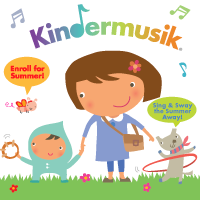
SING AND SWAY THE SUMMER AWAY WITH KINDERMUSIK OF LINCOLN
Yay! The 2015 Summer Schedule will be listed very soon under “Summer Classes”. The one big change you see in summer classes at Kindermusik of Lincoln, is that we have an abbreviated class schedule to allow teachers time to spend with their children. What will not change: Content, it’s still going to be AMAZING! Unlimited attendance, yep, we are keeping that too, which means more bang for your buck! We also had some fun arts and crafts activities for some of the classes too, depending on whether or not they are age appropriate. So keep checking back to see when SUMMER classes are up and ready to enroll!!!
Music for Big Kids!
4 Benefits of Music for Big Kids
 Growing up, but not all grown up yet – thankfully! The early years of childhood pass so quickly, and before you know it, your child has officially earned “big kid” status. The turbulence of the toddler years and the exuberance of the preschool years are past, and your big kid can mostly be described as composed, calm, cheerful, and capable. Big kids are eager, curious learners, and they love to share their ideas.
Growing up, but not all grown up yet – thankfully! The early years of childhood pass so quickly, and before you know it, your child has officially earned “big kid” status. The turbulence of the toddler years and the exuberance of the preschool years are past, and your big kid can mostly be described as composed, calm, cheerful, and capable. Big kids are eager, curious learners, and they love to share their ideas.
For a big kid, self-esteem, feeling capable, and doing things the “right way” all go hand-in-hand. They thrive on structure and affirmation, but they still need time to play and have fun. Big kids love being part of a group, and they crave friendship and acceptance from their peers, preferring to play and interact with others than to be by themselves. And while their thinking can be black-and-white, cognitively, they have made huge leaps in their ability to problem-solve and think more abstractly. Big kids tend to ask alot of “why” and “how” questions because they love to know a lot of facts. They love simple games, and having lots of time for creative play is very important. Movements are much more poised and controlled, and big kids loving showing off their new-found physical skills.
It is truly the age of opportunity for these learners-in-waiting. But it also a time not to be rushed through or passed over. The big kids years are a special time to settle in and enjoy the last phase of early childhood and to provide your child with experiences and opportunities that will set him up for success in school, in music, and in life.
That’s where Kindermusik comes in, providing a weekly class that satisfies the need to be part of a group, to learn new things, to play games, and to express oneself through music and movement. And in the middle of all of the fun and music-making, a very strong foundation is being laid for a successful transition to music lessons a little later on.
Here are four invaluable benefits of music for big kids:
1. Music exposes big kids to big, new ideas.
At this age, these eager learners are ready to be introduced to rhythms and rhythm patterns, music symbols, keyboards and dulcimers, and writing and composing their own music through hands-on and developmentally appropriate experiences. They can follow the story line of a work like “Peter and the Wolf” and identify the various motifs and instruments that are the hallmark of this beloved musical tale.
2. Music teaches big kids to be good listeners.
Focused listening and discriminatory listening are a big part of music. Listening for certain things in music or to certain music sounds as well as being able to distinguish between musical sounds and instruments develop listening skills. And while being a good listener is a musical skill, it’s also an extremely valuable life skill.
3. Music helps make the cognitive connections needed for nearly every kind of intelligence.
We all want our kids to be smart and to be successful, and music is the one common contributing factor in almost all of the nine types of intelligence. According to articles like this one and this one, it’s early experiences with music that best spark the brain connections and neural networks that actually shape the brain and impact how it will function later in life.
4. Music is one thing that stays in a child’s heart for forever.
There are lots of choices for early childhood – dance, sports, gymnastics, and more! But music is the one love, the one ability, that a child has the potential to carry with them all the way through their entire lives. Developing in your child a love and appreciation for music at an early age is a life-long gift you can give, and it’s something that will also carry with it special memories of the loved ones who made that gift possible.
 For parents…
For parents…
You want to give your child every advantage, and there’s truly no greater advantage you can give than music, especially in a program like Kindermusik. It’s the right activity at the right time, when your child is poised and ready to soak it all in and be enable to apply that knowledge to music lessons and musical experiences in the future. Kindermusik truly is the perfect foundation for lifelong learning.
And yet as profoundly as Kindermusik affects your child’s musical development, the musical learning is fun, pressure-free, and exactly what your child needs at a time when they can benefit from it the most.
“Music develops the appetite for learning and creates habits of self-discipline and personal tenacity which carry over into every facet of school. Young musicians are skilled at concentration, alertness, memory, and self-control. These attributes are basic for success in higher education, but more importantly, in succeeding at life.”
—The Joy of Inspired Teaching, by Tim Lautzenheiser, p. 55
